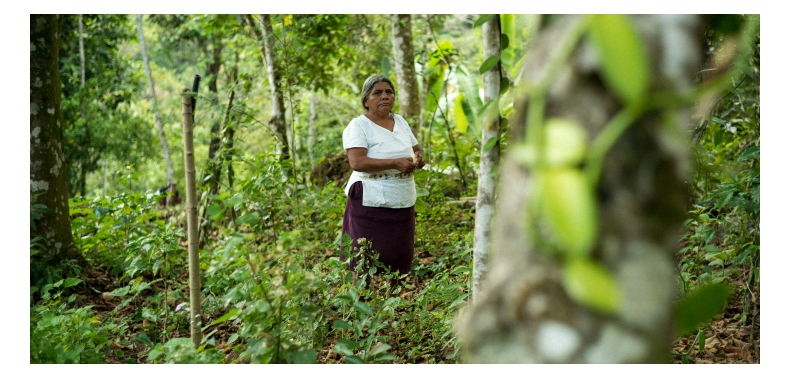
Introducing the first cohort of Everyone's Business programme!
Meet the 11 social enterprises contributing to a more inclusive, sustainable, and hopeful Sweden.
The Copalita-Zimatan-Huatulco watersheds lie in the state of Oaxaca, Mexico and are pieced and held together by ecosystems made up of mangroves in the South, and sinuous hills of pine-oak forests in the North, with endemic species of birds like the Sinaloa Wren and the Golden-cheeked Woodpecker flying over them 1.
In the upstream portion of the CZH, surrounded by this life, lies the municipality of San Miguel Suchixtepec, a community of approximately 3,000 people. The residents of San Miguel are mostly of Zapotec ethnicity, an indigenous group that, along with pre-Mayan Chontal, have a presence in the region that can be traced back to 15,000 years 2.
 (photo by Antonio Hernández Ramos / WWF-México)
(photo by Antonio Hernández Ramos / WWF-México)
Unfortunately, this environmentally and culturally significant landscape suffers from deforestation caused by excess logging, water contamination from domestic, urban, and agricultural sources, and the effects of climate change on water availability. Since 2004, WWF has worked with communities like San Miguel Suchixtepec to monitor, safeguard and restore the landscape through reforestation, capacity building with the best agriculture and water management practices.
The 13 social enterprises participating in the Community Conservation Programme are made up of people from communities living within the watersheds, including San Miguel Suchixtepec. These social entrepreneurs are inspired by generations of Zapotec knowledge and traditions that seek a more balanced relationship between people and nature.
To recognize and celebrate our collaboration with them Nayé, Guitiani, and Alternativa Agrícola Suchixtepecto share their thoughts about how Zapotec culture and their relationship with nature empowers them to create sustainable livelihoods for their communities and future.
Transmitting that knowledge also supports Jonathan to improve his own skills: “I always found it hard to speak in public and effectively communicate my message. It’s comforting to see that I’m already making improvements in those areas.”
Jonathan´s colleague Gabriela Rivera agrees that there´s no need to be an expert at business mentoring to make a significant contribution. Gabriela is a replenishment supply specialist at IKSO, and supports Fresh & Co, an agribiz enterprise that is just starting operations. Gabriela explains:
This is a really beautiful company that buys fruit and vegetables from smallholder farmers in a way that respects the environment. That costs more money than buying from large producers. That´s why we work with them to optimize other parts of the business so they can save money there. They share information for me to have a look at, and together we construct something better. I feel really good I can support them with what I know. I would say to any other co-worker: it´s easy, the only thing you have to do is use your knowledge.
Time should not be a problem, either, Gabriela adds: “We are all so busy with so many things we have to do in our daily jobs, but you can always find one or two hours a week to give to a social enterprise. You´ll be happy and excited when you share your knowledge to open new opportunities. Just do it!”
Along with 10 other social enterprises from different parts of CZH, Nayé, Guitiani and AAS, are Community Conservation Enterprises (CCE): enterprises that provide dignified, sustainable livelihoods, that preserve the ecosystems in the watersheds.
 (photo by Antonio Hernández Ramos / WWF-México)
(photo by Antonio Hernández Ramos / WWF-México)
Beyond having successful, environmentally-friendly businesses, however, these enterprises aim to develop their products and overcome challenges on their terms: faithful to the cultural and family traditions they’re rooted in.
Competition is our biggest challenge. There are companies with better presentations and marketing, but we're told people like our story and how we came to be. And among us, we say that we need to believe in our product, believe in its effectiveness, and hope people do so as well.
Fabiola, Nayé
We struggle to be completely independent and make and improve our organic agri-inputs – fertilizers, pesticides – and increase our productivity through agro-ecology. (…) But we are working on it, generating ideas and learning how to apply science on our processes.
Romeo, Alternativa Agrícola Suchixtepec
We need to find a stable, committed market for our product. At times we don’t work 100% of our time on parcels of land, because we know that we’ll have a lot of product, but no place to sell it.
Porfirio , Guitiani
They felt less alone. For a small company as they are, it is important to have someone listening without judging. Some of the questions we asked triggered them to get out of the circle you sometimes get stuck in when you’re missing an outside perspective. We encouraged them to get away from the theory and their computer screens and try things out in the real world.
 (photo by Antonio Hernández Ramos / WWF-México)
(photo by Antonio Hernández Ramos / WWF-México)
Community Conservation Programme | Partnerships
[1] Mansourian, S., González Mora, I.D., Palmas Tenorio, M.A., Spota Diericx, G. and Vallauri, D., 2020. Lessons Learned from 15 Years of Integrated Watershed Management and Forest Restoration: the Copalita-Zimatán-Huatulco Landscape in Mexico. Paris: WWF France, WWF report, field series, Experiences in Forest Landscape Restoration, 44 pages.
[2] Danver, S., 2015. Native Peoples of the World: An Ency-clopedia of Groups Cultures and Contemporary Issues. Oxon and New York: Routledge, 1030 pages.